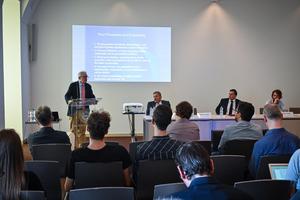The Catalysts of Wars for Nation-Building: Although we all yearn for peace, war remains integral to Europe's history. Examining the impact of wars on nations in the border regions of former empires is particularly important. These issues were discussed at a scientific exchange event at Ludovika University of Public Service.
In the current academic year, the József Eötvös Research Center (EJKK) of the Ludovika University of Public Service organised its first conference and invited John Hutchinson, a researcher from the London School of Economics and Political Science and former lecturer at Griffith University in Brisbane, as the keynote speaker. The event, which took place on September 19th in the Zrínyi Miklós Hall of the Ludovika Main Building, was organised by the institute as part of a conference series."
Molnár Attila Károly, the director of the institute, welcomed and introduced the participants on behalf of the organisers. Deli Gergely, the rector of Ludovika University of Public Service, greeted the attendees. In his address, he emphasised that Ludovika University of Public Service aims to establish broad international connections, including attracting internationally renowned researchers to Budapest. He pointed out that science primarily exists in the international arena, but its results can be integrated into domestic security policy thinking. Therefore, it is important to understand concepts such as nationalism and imperial ideology. The rector highlighted that nationalism is not only part of history but also of our present, which is why it is crucial to comprehend its characteristics through the findings of science. He added that while history is the teacher of life, life is also capable of shedding light on and helping us understand history.
In his opening speech, Henrik Hőnich, a Research Fellow at LUPS EJKK MTKI, highlighted the significance of the lecturer, John Hutchinson, as one of the leading researchers in the Ethno-symbolist School, which Anthony D. Smith founded. This school of thought emphasises the role of embedded historical memories in forming modern nations. Hőnich pointed out that in recent times, postmodern thinking has eroded the notion of national identity. However, Hutchinson's work takes a different approach by distinguishing between cultural and political aspects of nationalism. He argued that historically rooted cultural nationalism can help bind a nation together, even in times of crisis. As a result, cultural nationalism can either align with or oppose political nationalism, making nationalism a dynamically adaptive concept rather than a monolithic one. Henrik Hőnich also emphasised that a central focus in the professor's work is national consciousness and community identity, which have faced challenges not only in the present but throughout history.
In his presentation titled "Wars, Nation-Building, and Imperial Borderlands," John Hutchinson identified four nation-building processes in relation to wars. As he explained, war is an inevitable element of history, and modern wars, in particular, have shaped precise state records and administration, as well as the practice of taxation. Peace treaties that conclude wars have also established international rules of the game.
War is defined as armed conflict between two political communities, and it often has significant societal consequences, whether in victory or defeat. The first important element of nation-building is that war creates unified narratives that spread throughout society, even retroactively. Narrators in the aftermath of war construct the idea of a past golden age, which can also be used to explain the present. Defining territorial boundaries and the concept of homeland are also part of nation-building. During war, stereotypes of "us" and "them" are formed.
The moral consequences of war also shape the nation, primarily concerning the expected sacrifices made for the nation. After a war, ritual obligations are created, which can evolve into a shared identity. War transcends individual family histories and becomes part of the collective memory of the nation, acquiring not only structures but also distinct buildings and customs.
The end of war also has a nation-building effect. During this time, a new geopolitical order is established, with winners and losers. Emotions can turn against the ruling regime or minority groups living in the area. A common phenomenon during this period is the scapegoating of certain individuals or groups. The Hungarian people have significant experiences regarding fundamental national questions arising after wars, added the professor.
You can read more about the renowned researcher's lecture on the university's scientific platform, ludovika.hu.
Text: Tibor Sarnyai
Photo: Dénes Szilágyi
